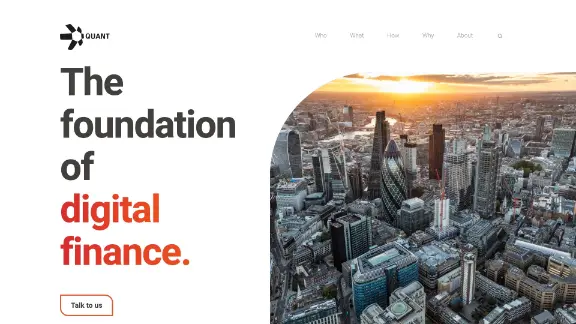Quant (QNT)
The Quant Network is an open-source communication protocol designed to connect businesses and developers with multiple distributed ledger technologies (DLTs) simultaneously. It is recognized as the first blockchain operating system that bridges blockchains globally without affecting the efficiency and other properties of the connected DLTs.
Overview
Quant Network was founded in 2015 by Gilbert Verdian as a solution to the increasing challenge of blockchain interoperability. It offers a secure and efficient way to communicate with different DLTs. The network is powered by its own cryptocurrency, Quant (QNT), and is classified as an interoperability blockchain platform. Developers and enterprises can use the network without purchasing QNT tokens, although payment for licenses and fees must be made in QNT.
The Quant Network operates through Overledger, a DLT operating system serving as an API gateway for multiple blockchains, including Bitcoin, Ethereum, Hyperledger Fabric, R3 Corda, and BNB Chain. This allows developers to build multichain decentralized applications (mDApps) easily.

| Ticker | QNT |
| Category | Protocol |
| Website | https://www.quant.network |
| @quant_network | |
| Telegram | quantnetworkannouncements |
| https://www.reddit.com/r/QuantNetwork/ | |
| Contract Addresses | |
|---|---|
| ethereum | 0x4a...75 Copied! Copied! |
| energi | 0x46...65 Copied! Copied! |
History
Quant was announced and launched in 2018 by Gilbert Verdian, Colin Paterson, and Paolo Tasca. Verdian's experience as a cybersecurity expert, including work with the UK Financial Investments and the US Federal Reserve, facilitated Quant Network's market entry. In April 2018, the network raised $11 million through an initial coin offering (ICO). A major update, Overledger version 2.0.5, was released on September 8, 2021, enabling the bridging of leading ecosystems and supporting stablecoins, DeFi, NFT, and ERC20/ERC721 assets. On August 4, 2022, Overledger 2.2.12 introduced the Overledger Tokenise feature for creating and managing secure, interoperable tokens.
Utility
With Quant tokens, users can access the platform's services. To utilize Quant’s blockchain operating system, Overledger, users must pay for licensing and platform fees using QNT. Developers and enterprises can leverage Overledger to build decentralized multi-chain applications (mDApps) by staking QNT tokens. The Quant ecosystem handles user access fees by locking up the token in a smart contract or moving them into the Treasury.
Infrastructure
The Quant Network utilizes Overledger, an infrastructure that serves as an API gateway supporting multiple distributed ledgers, enabling developers to create mDApps.
Overledger
Overledger addresses blockchain interoperability issues with a protocol architecture comprising four layers that ensure seamless communication between multiple blockchains.
Transaction layer
This layer stores verified transactions using DLT, simplifying consensus across different blockchain domains.
Messaging layer
The messaging layer serves as a shared channel for recording transactions from multiple ledgers, wrapping all transaction information.
Filtering and ordering layer
This layer filters and orders messages, ensuring compliance with application requirements, such as transaction validity and address restrictions.
Application layer
The application layer governs all other layers, establishing guidelines for blockchain interaction. It isolates each multichain application, requiring a set of communication rules for mDApps with other programs and the Overledger system.
Use cases
Quant offers several use cases to create value and reduce risks.
Capital markets
Quant exposes tokenized assets to new liquidity pools, enhancing market exposure and portfolio diversification.
Payments
Quant provides flexible and secure payment channels for digital and fiat currencies, reducing transaction fees.
Digital currencies
Overledger supports a genuinely interoperable economy as central banks explore digital currency adoption.
Insurance
Quant Network streamlines the insurance system, enhancing operational effectiveness.
Supply chain and trade finance
Quant optimizes logistics, payments, and customs, improving supply chain efficiency.
Compliance
Quant Network improves payment tracking across networks, making it more relatable and trackable.
Quant Token (QNT)
QNT is an ERC-20 standard token on the Ethereum blockchain with a total supply of 14,692,423 tokens. It is blockchain agnostic and can be adapted to any blockchain infrastructure. Developers need QNT to build on Overledger, and end-users require it to access mDApps and the Overledger ecosystem.
QNT tokenomics
QNT has a max supply of 14,612,493 tokens, allocated as follows:
- 9,964,259 sold to the public during the ICO
- 2,649,493 for company reserve (R&D, marketing, etc.)
- 1,347,988 for company founders
- 650,753 for company advisors
Quant Network has a current circulating supply of 12,072,738 QNT, with around 2 million tokens locked by the company.
Quant Tokenise
Overledger Tokenise is a premium API allowing users to create, deploy, and manage digital assets, including QRC-721 non-fungible tokens, on supported networks like Ethereum and Polygon. It offers an easy-to-use interface via Quant Connect, facilitating secure and interoperable token management.
Team
- Gilbert Verdian: Founder and Chief Executive Officer
- Martin Hargreaves: Chief Product Officer
- Lara Verdian: Chief Operating Officer
- Peter Marirosans: Chief Technology Officer
- Andrew Carrier: Chief Marketing Officer
- Helen Kemmit: General Counsel
- Gagik Alaverdian: Chief Operating Officer of Americas
- Dr. Luke Riley: Head of Innovation
- Christopher Harrison: Head of Engineering
- Andy Nelson: Head of Systems and Architecture
Board of Directors
- Guy Dietrich
- Neil Smit
